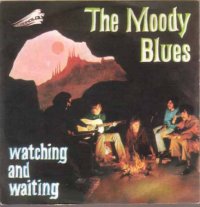
The Moody Blues were an English rock band formed in Birmingham in May 1964. The band initially consisted of drummer Graeme Edge, guitarist/vocalist Denny Laine, keyboardist/vocalist Mike Pinder, multi-instrumentalist/vocalist Ray Thomas, and bassist/vocalist Clint Warwick. Originally part of the British beat and R&B scene of the early–mid 1960s, the band came to prominence with the UK No. 1 and US Top 10 single "Go Now" in late 1964/early 1965. Laine and Warwick left the band by the end of 1966, being replaced by guitarist/vocalist Justin Hayward and bassist/vocalist John Lodge. They embraced the psychedelic rock movement of the late 1960s, with their second album, 1967's Days of Future Passed, being a fusion of rock with classical music that established the band as pioneers in the development of art rock and progressive rock. It has been described as a "landmark" and "one of the first successful concept albums".

Days of Future Passed is the second album and first concept album by English progressive rock band The Moody Blues, released in November 1967 by Deram Records.

A Question of Balance is the sixth album by The Moody Blues, released in 1970. The album reached No. 1 in the United Kingdom and No. 3 in the United States.

On the Threshold of a Dream is the fourth album by The Moody Blues, released in April 1969 on the Deram label. The album reached the top of the album charts, the group's first No. 1 album in the UK. According to guitarist Justin Hayward, "I think Threshold is the defining album for the Moody Blues. And it's the one in the '60's that you would find in people's homes when you went, they would have that album."

David Justin Hayward is an English musician. He was the guitarist and frontman of the rock band the Moody Blues from 1966 until that group's dissolution in 2018. He became the group's principal vocalist and its most prolific songwriter over the 1967–1974 period, and composed several international hit singles for the band.
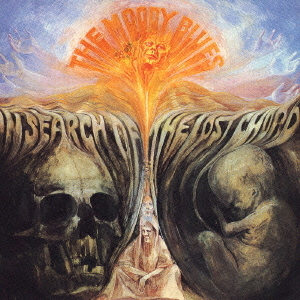
In Search of the Lost Chord is the third album by The Moody Blues, released in July 1968 on the Deram label.

To Our Children's Children's Children is the fifth album by the Moody Blues, released in November 1969.
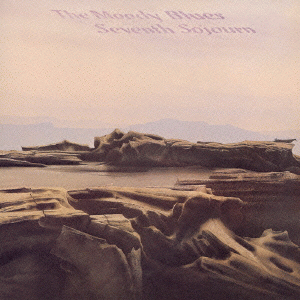
Seventh Sojourn is the eighth album by the Moody Blues, released in April 1972. The album reached No. 5 in the United Kingdom, and became the band's first American chart-topper, spending five weeks at No. 1 there to close out 1972.
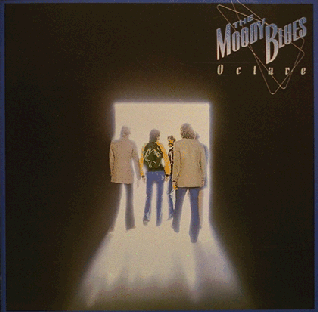
Octave is the ninth album by The Moody Blues, released in 1978, and their first release after a substantial hiatus following the success of the best-selling Seventh Sojourn in 1972. Released after a considerable break, which saw The Moody Blues returning in an era of punk music and disco, Octave produced a reduced commercial outcome for the band, but reached No. 6 in the United Kingdom and went platinum in the United States, where the album reached No. 13. The album produced the hit single "Steppin' in a Slide Zone", which hit No. 39 in the US, in addition to "Driftwood". The album's title is a musical pun: it references both the notion of an octave; and as a word derived from the Latin octavus it refers to this being the eighth album by this line-up of the Moody Blues.

Every Good Boy Deserves Favour is the seventh album by The Moody Blues, released in 1971. The album reached No. 1 on the British album chart, in addition to a three-week stay at No. 2 in the United States, and produced one top-40 single, "The Story in Your Eyes".

Raymond Thomas was an English musician, singer and songwriter. He was best known as a founding member of the English progressive rock band the Moody Blues. His flute solo on the band's 1967 hit single "Nights in White Satin" is regarded as one of progressive rock's defining moments. In 2018, he was posthumously inducted into the Rock and Roll Hall of Fame as a member of the Moody Blues.

Graeme Charles Edge was an English musician, songwriter and poet, best known as the co-founder and drummer of the English band the Moody Blues. In addition to his work with the Moody Blues, Edge worked as the bandleader of his own outfit, the Graeme Edge Band. He contributed his talents to a variety of other projects throughout his career. In 2018, Edge was inducted into the Rock and Roll Hall of Fame as a member of the Moody Blues.

John Charles Lodge is an English musician, best known as bass guitarist, vocalist, and songwriter of the longstanding rock band the Moody Blues. He has also worked as a record producer and has collaborated with other musicians outside the band. In 2018, Lodge was inducted into the Rock and Roll Hall of Fame as a member of the Moody Blues.

This Is The Moody Blues is a two LP compilation album by the Moody Blues, released in late 1974 while the band was on a self-imposed sabbatical. Though all of the songs were previously released on albums, several of them are heard here in distinctly different mixes. Like the Moody Blues albums of the time – but unlike most compilation albums, including later Moody Blues compilations – the songs on this album segue seamlessly, without silence between tracks. On the original LP, this was true of the songs on each side; when the album was remastered for CD, each disc was also blended, so that "Legend of a Mind" segues into "In the Beginning", and "Watching and Waiting" segues into "I'm Just a Singer ".

"Tuesday Afternoon" is a 1968 song written by Justin Hayward that was first released by English rock band the Moody Blues on their 1967 album Days of Future Passed and later released as a single.
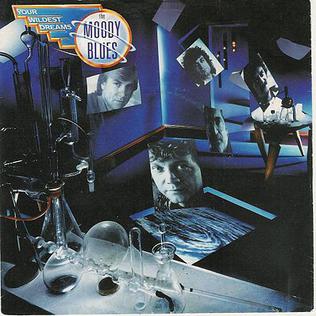
"Your Wildest Dreams" is a 1986 single by the progressive rock band the Moody Blues, written by Justin Hayward. The song was first released as a single, and later released on the Moody Blues' 1986 album The Other Side of Life.
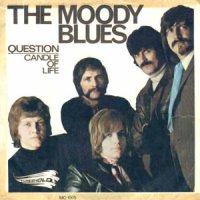
"Question" is a 1970 single by the English progressive rock band the Moody Blues. It was written by guitarist Justin Hayward, who provides lead vocals. "Question" was first released as a single in April 1970 and remains their second highest-charting song in the UK, reaching number two and staying on the chart for 12 weeks. The song reached number 21 on the Billboard Top 40 in the USA. It was later featured as the lead track on the 1970 album A Question of Balance. The single also features the song "Candle of Life" on its B-side, which was from the Moody Blues' previous album To Our Children's Children's Children.
"Gypsy (Of a Strange and Distant Time)" is a 1969 song by the progressive rock band the Moody Blues, from their album To Our Children's Children's Children, a concept album about space travel. The song was written by band-member Justin Hayward.
"Out and In" is a 1969 song by the progressive rock band the Moody Blues, from their album To Our Children's Children's Children, a concept album about space travel. Prior to its release on To Our Children's Children's Children, "Out and In" was released on the B-side of the single "Watching and Waiting," the album's only single.

Michael Thomas Pinder is an English musician. He is a founding member and the original keyboard player of the rock group the Moody Blues. He left the group following the recording of the band's ninth album Octave in 1978. Pinder is renown for his technological contributions to rock music, most notably in the development and emergence of the Mellotron in the 1960s decade. In 2018, he was inducted into the Rock and Roll Hall of Fame as a member of the Moody Blues. He is the last surviving member of the group's original five members.
